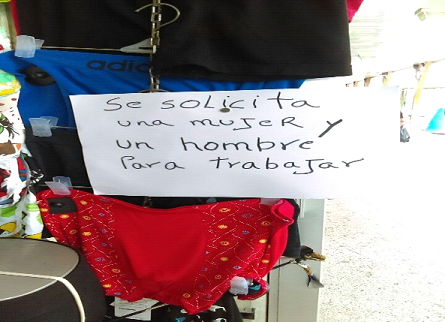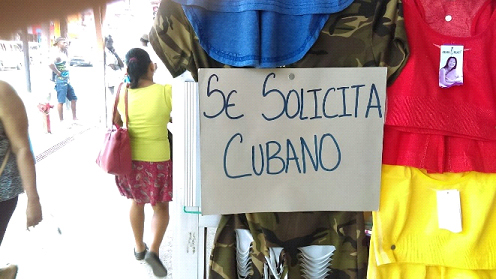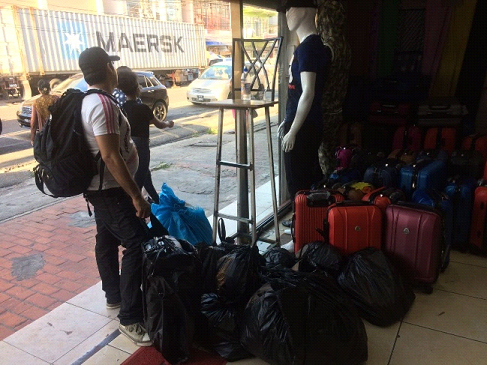Every day on the streets of Georgetown, Cuban shoppers can be seen carting along garbage bags full of clothing and other items. They wade in and out of stores, mainly along Regent and Robb streets, and travel in groups, both large and small. Very few of them speak English, and so transacting business usually proves difficult—though not impossible—for both shopper and salesperson. But the local proprietors are adapting.
Many have long moved passed mere gesticulation and dependency on the calculator display as a means of communicating with their Cuban shoppers. They are now hiring Spanish speakers, and more often than not, those being hired are Cubans themselves.
The signs are there—strategically placed in the store windows, or scotch taped to the walls and doors of the establishments. They are also clear: Spanish salesmen and women are in high demand.
“Wanted. Sales girls or boys [Speaking Spanish],” one reads. “Se solicita Cubano,” says another, and “Se solicita una mujer y un hombre para trabajar.”
Electronics store Gizmos and Gadgets has boldly displayed on its window a sign reading, “Hablamos Espanol,” an announcement that the staff there speaks Spanish, and hence, can provide service to Spanish speaking customers.
Sophia Dolphin, a manager at Gizmos and Gadgets, said that the Cubans usually come into the store in large batches, with around 20 to 25 coming in per day. “Because we try to meet every customer’s need, and if you find that a lot of Spanish persons are coming into the store, you need to have some type of preparation for them and you don’t want language to be a barrier. So you have to have your staff very familiar and they must be able to speak multiple languages so that every customer will leave the store happy, regardless of their spending power,” Dolphin stated.
The “New Sachi” store on Regent Street is run by Chinese merchants, but when a Chinese worker stationed there beckons to a group of Cubans crossing the street, “Hola amigo!” are the words he chooses to greet them.
Once known simply as “Sachi,” the establishment now boasts new ownership, and new lettering on the shirts of some of the employees. In the New Sachi store, there is a Cubano. He, like the others, is all too happy to be approached by another who speaks his native tongue.
Relating that his travel here was fueled by the state of the economy in Cuba, the man says that he has been in Guyana for four months now, but has only been employed at the store for two days.
It is not his first experience in the local retail business, however; he is a drifter. He advises that if you are looking for work, all you need to do is walk in and relate to the storeowners that you’re a Spanish speaker, but know a bit of English.
Across the street at the Discount Store, known for its selection of affordable footwear, a section of the establishment is being occupied by Chinese sellers. They too have added Cuban employees to their roster.
The woman there says she learnt about Guyana through family members who have travelled here before. She is thinking of staying, though, she says, noting that she cannot herself afford the clothing trade that so many of her fellow Cubans have taken up.
The description she provides of those involved in the Cuba-Guyana trade sounds akin to a community; she relates that those who have travelled here before offer advice on places to stay and shop.
Another man—a shopper, not a salesman—related that the trade is not restricted to clothing, but includes items such as sheets, towels, shoes, and other such amenities, which are bought and resold in Cuba.
He, like the worker in Sachi, makes reference to the state of the economy when asked why he chose to travel here, but he remarks that the situation in Cuba is a little better than that in Venezuela.
Across the road, Lincos, a clothing store, has its “closing down sale.” Patrons flow steadily into the business place, where they assess the racks of clothing before going in for the buy, or leaving the way they came.
When Stabroek News visited the establishment a few weeks ago, the manager related that the owner would be renting the building to a Chinese proprietor instead, but would not divulge the reason for doing so.
City businesses that have served the Guyanese community for years have been closing their doors, and some have been renting their buildings to foreign proprietors, who are now rapidly encroaching on the retail trade.
The buildings that once housed businesses such as Acme, Keishars and Stretch Yuh Dollar are now the homes of new ones run by Chinese and Indian nationals.
(Translation and photos, unless otherwise stated, by Romina Softleigh)













